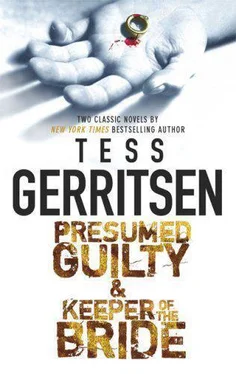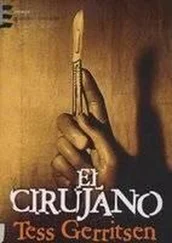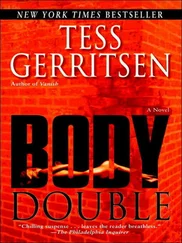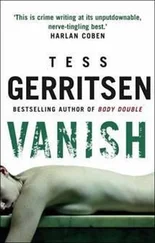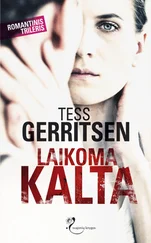Tess Gerritsen - Presumed Guilty
Здесь есть возможность читать онлайн «Tess Gerritsen - Presumed Guilty» — ознакомительный отрывок электронной книги совершенно бесплатно, а после прочтения отрывка купить полную версию. В некоторых случаях можно слушать аудио, скачать через торрент в формате fb2 и присутствует краткое содержание. Год выпуска: 2008, ISBN: 2008, Жанр: Триллер, на английском языке. Описание произведения, (предисловие) а так же отзывы посетителей доступны на портале библиотеки ЛибКат.
- Название:Presumed Guilty
- Автор:
- Жанр:
- Год:2008
- ISBN:9780778327066
- Рейтинг книги:5 / 5. Голосов: 1
-
Избранное:Добавить в избранное
- Отзывы:
-
Ваша оценка:
- 100
- 1
- 2
- 3
- 4
- 5
Presumed Guilty: краткое содержание, описание и аннотация
Предлагаем к чтению аннотацию, описание, краткое содержание или предисловие (зависит от того, что написал сам автор книги «Presumed Guilty»). Если вы не нашли необходимую информацию о книге — напишите в комментариях, мы постараемся отыскать её.
Presumed Guilty — читать онлайн ознакомительный отрывок
Ниже представлен текст книги, разбитый по страницам. Система сохранения места последней прочитанной страницы, позволяет с удобством читать онлайн бесплатно книгу «Presumed Guilty», без необходимости каждый раз заново искать на чём Вы остановились. Поставьте закладку, и сможете в любой момент перейти на страницу, на которой закончили чтение.
Интервал:
Закладка:
He’d planned to return at once to Rose Hill Cottage. Instead, he drove to the Herald.
He found the office manned only by a skeleton crew: the summer intern, tapping at a computer keyboard, and the layout tech, stooped over a drawing table. Chase walked past them, into Richard’s office, and went straight to the file cabinet.
He found Jill Vickery’s employment file right where it should be. He sat at the desk and opened the folder.
Inside was a neatly typed résumé, three pages, all the right names and jobs. B.A., Bowdoin, 1977. Masters, Columbia, 1979. Stints on the city desk, San Francisco Chronicle; then obits, San Diego Union; police beat, San Jose Times; op-ed editor, Portland Press Herald. A solid résumé.
So why does she end up here?
Something about that résumé bothered him. Something that didn’t seem quite right. It was enough to make him reach for the phone and dial the Portland Press Herald, her previous employer. He spoke to the current op-ed editor, a woman who vaguely recalled a Jill Vickery. It had been a while back, though.
Chase next called the San Jose Times. This time there was some uncertainty, a lot of yelling around the city room, asking if anyone remembered a reporter named Jill Vickery from seven years before. Someone yelled, wasn’t there a Jill on the police beat years back? That was good enough for Chase. He hung up and considered letting it drop.
Still, that résumé. What was it that bothered him?
The obits. San Diego Union. That didn’t make sense. Obits was the coal mine equivalent of the newspaper business. You worked your way up from there. Why had she gone from the city desk in San Francisco to a bottom-of-the-barrel position?
He dialed the San Diego Union. No one named Jill Vickery had ever worked there.
Ditto for San Francisco.
Half the résumé was a fraud. Was it just a case of padding a thin work history? And what was she doing during those eight years between college and her job with the San Jose Times?
Once again he reached for the phone. This time he called Columbia University, Department of Journalism. In any given year, how many students could possibly graduate with a master’s degree? And how many of these students would have the first name Jill?
There was only one in 1979, they told him. But it wasn’t a Jill Vickery who’d graduated. It was a Jill Westcott.
Once again, he called the San Diego Union. This time he asked about a Jill Westcott. This time they remembered the name. We’ll fax you the article, they said.
A few minutes later it slid out of the fax machine, sharp and clear.
A photo of Jill Westcott, now named Jill Vickery. And with it was a tale of coldblooded murder.
Miranda sat in the fading light of day and stared listlessly at her surroundings. She’d spent the afternoon rummaging through the bathroom and two bedrooms. Now she was hot, dusty and discouraged. Nothing of substance had turned up, only innocuous bits of paper — store receipts, a ten-year-old postcard from Spain, another typewritten note from M.
…I am not the weak little nothing I used to be. I can live without you quite nicely, and I intend to do so. I don’t need your pity. I am not like the others, those women with minds the size of walnut shells. What I want to know, what I don’t understand, is what attracts you to creatures like that? Is it the jiggling flesh? The cow-eyed worship? Well, it doesn’t mean a thing. It’s empty devotion. Without your money, you wouldn’t rate a second glance from those bimbos. I’m the only one who doesn’t give a damn how much you have in the bank. And now you’ve lost me.
The bitterness, the pain of that letter seemed to rub off on her own mood. She put it back in the drawer, buried it among the silky underclothes. Another woman’s lingerie. Another woman’s anguish.
By the time she’d straightened up the room again the afternoon had slid toward twilight. She didn’t turn on the lamp. It was soothing, the veil of semidarkness, the chirp of crickets through the open window. From the field came that indefinable scent of evening — the mist from the sea, the cooling grasses. She went to a chair by the window, sat down and leaned her head back to rest. So many doubts, so many worries weighed upon her. Always, looming over every tentative moment of joy, was that threat of prison. There were times, during these past few days of freedom, that she had almost been able to push the thought from mind. But in the moments like this, when the silence was deep and she was alone in her fears, the image of prison bars seemed to close around her. How many years will they keep me? Ten, twenty, a lifetime?
I would rather die.
She shuddered back to alertness.
Downstairs, the screen door had softly squealed open.
“Chase?” she called. “Is that you?” There was silence. She rose from the chair and went to the top of the stairs. “Chase?”
She heard the screen door softly tap shut, then there was nothing, only the distant chirp of crickets from the fields.
Her first instinct was to reach for the light switch. Just in time she stopped herself. Darkness was her friend. It would hide her, protect her.
She shrank away from the stairs. Trembling, she stood with her back pressed against the wall and listened. No new sounds drifted up from the first floor. All she heard was the hammering of her own heartbeat. Her palms were slick. Every nerve ending was scraped raw with fear.
There it was — a footstep. In the kitchen. An image shot through her mind. The cabinets, the drawers. The knives.
Her breath was coming in tight gasps. She shrank farther from the stairs, her thoughts flying frantically toward escape. Two upstairs bedrooms, plus a bathroom. And screens on all the windows. Could she make it through in time?
From below came more footsteps. The intruder had moved out of the kitchen. He was approaching the stairs.
Miranda fled into the master bedroom. Darkness obscured her path; she collided with a nightstand. A lamp wobbled, fell over. The clatter as it crashed to the floor was all the intruder needed to direct him toward this bedroom.
In panic she dashed to the window. Through the darkness she saw a portion of gently sloping roof. From there it would be a twenty-foot drop to the ground. The sash was already up. Only the screen stood between her and freedom. She shoved at it — and it refused to push free. Only then did she see that the screen had been nailed to the window frame.
Frantic now, she began to kick at the steel mesh, sobbing as each blow met resistance. Again and again she kicked, and each time the wire sagged outward, but held.
A footstep creaked on the stairway.
She aimed a last desperate kick at the mesh.
The window frame splintered, and the whole screen fell away and thudded to the ground. At once she scrambled over the sill and dropped down onto the ledge of roof. There she hesitated, torn between the solid comfort of shingles beneath her feet and the free-fall of escape. She couldn’t see what lay directly below. The rosebushes? She grabbed hold of the roof and lowered her body over the edge. For a few seconds she clung there, steeling herself for the impact.
She let go.
The night air rushed up at her. The fall seemed endless, a hurtling downward through space and darkness.
Her feet slammed into the ground. Instantly her legs buckled, and she fell sprawling to the gravel. For a moment she lay there as the sky whirled overhead like a kaleidoscope of stars. A frantic burst of adrenaline had masked all the sensation of pain. Her legs could be shattered. She wouldn’t have felt it. She knew only that she had to escape, had to run.
Читать дальшеИнтервал:
Закладка:
Похожие книги на «Presumed Guilty»
Представляем Вашему вниманию похожие книги на «Presumed Guilty» списком для выбора. Мы отобрали схожую по названию и смыслу литературу в надежде предоставить читателям больше вариантов отыскать новые, интересные, ещё непрочитанные произведения.
Обсуждение, отзывы о книге «Presumed Guilty» и просто собственные мнения читателей. Оставьте ваши комментарии, напишите, что Вы думаете о произведении, его смысле или главных героях. Укажите что конкретно понравилось, а что нет, и почему Вы так считаете.
